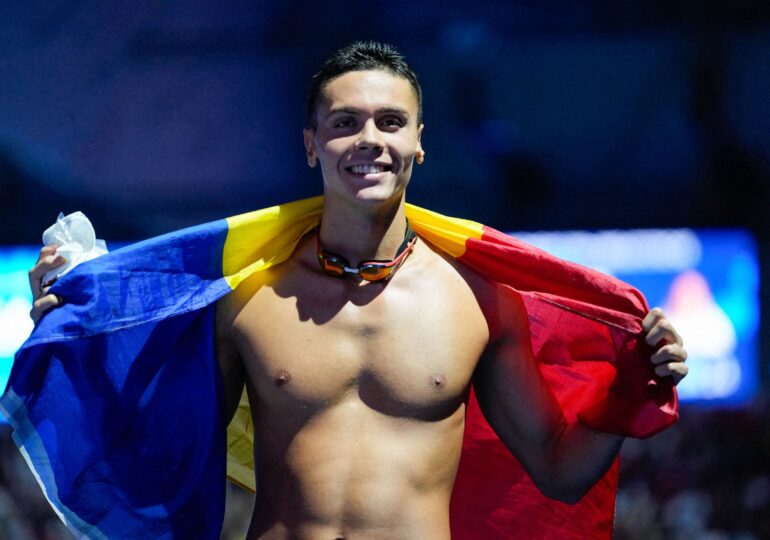In the F1 movie, the great summer success, pilot Sonny Hayes, played by the famous actor Brad Pitt, tells that when you cross the finish line first in a Formula 1 Grand Prix, you feel with your whole body that you are the fastest mortal, at least until the next race.
The aforementioned line was the first thought that came to my mind when David Popovici touched the cold porcelain at the end of the pool with his fingertips, swimming a hundred meters in 46 and a half seconds. He was the fastest swimmer on the planet, the best time ever recorded at the World Swimming Championships, in the star event, the 100 meters.
„I try to protect him for the rest of his life from all perspectives,” stated his coach Adrian Rădulescu, shortly after he won his second gold medal.
The tall giant standing at 1.90 meters and weighing 80 kilograms doesn't seem like he needs any protection from anyone, especially from the position of the fastest swimmer in the world, but life is complicated, full of paradoxical situations, and a high-performance athlete is always in search of an unending source of motivation and another of concentration, which truly consumes his soul and mind like a drug.
"Success exposes us. David Popovici said he was afraid to reach his potential. It wasn't the fear of failure that overwhelmed him, but the fear of visibility that he can no longer control," stated psychotherapist Andreea Goliță, exclusively for Spotmedia.ro.
His successes have quietly sparked a revolution in Romania, one of willpower, intense work, and victory.
David Popovici, alongside Simona Halep, are the champions of a new era where medals are no longer political objectives, their performance is no longer confiscated by opportunists building public careers on their sweat, and performance is no longer an effect of fear, hunger, or despair, as it was in communism and a few decades after.
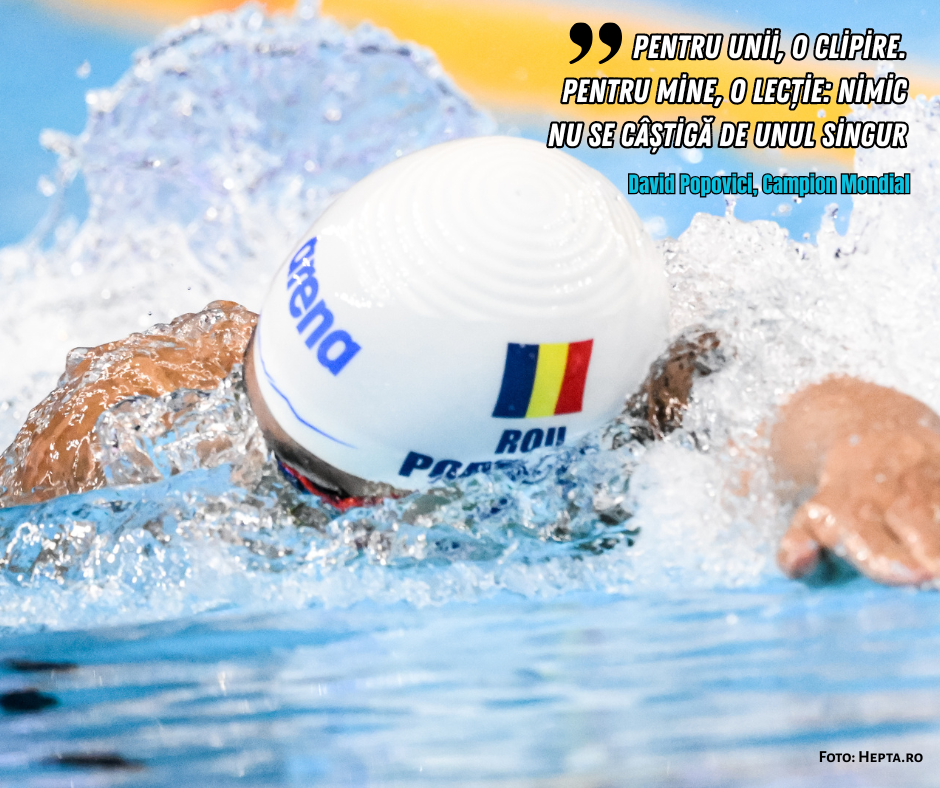
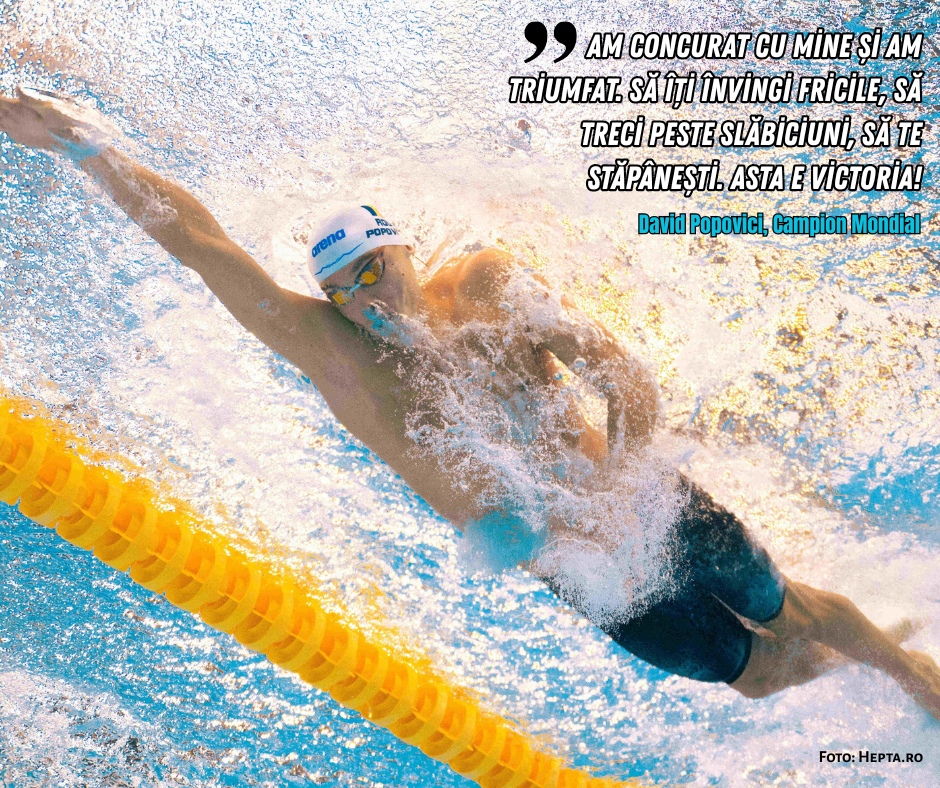
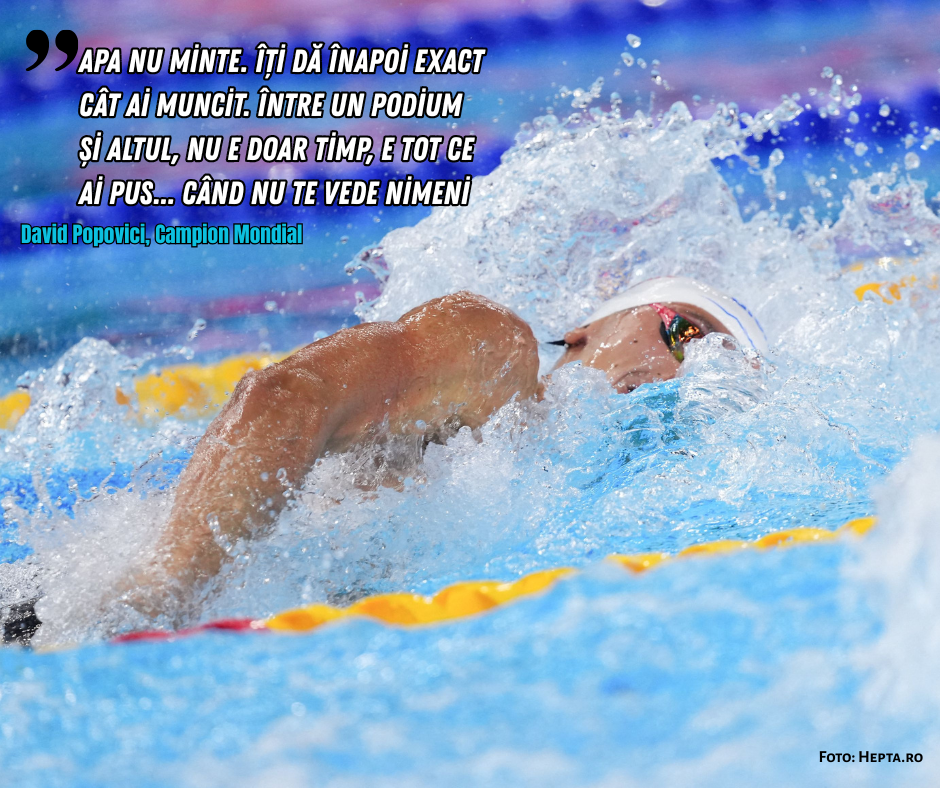
David Popovici's body, muscles, and mind are the effects of a project based on thought and science; his personality is the culmination of a vision built on reasoning and decisions made together, in perfect harmony, by him, his parents, and his coach.
Building Walls
In second place, in the 100-meter final in Singapore, swimmer Jack Alexy from the USA came with a time of 46.92 seconds, 41 hundredths behind David Popovici.
Here's an experiment for you. Put your smartwatch on the stopwatch and try to start and stop it as quickly as possible.
I've done this about 50 times and managed to stop the stopwatch, in most cases, in 20 hundredths of a second. So, the difference between the two was approximately the time it takes to make a tap-tap on Instagram to like a friend's photo on an exotic beach, enjoying a cocktail.
This is what David Popovici is up against, a fraction of a time that we, in our daily lives, hardly notice, finding it difficult to even imagine.
"Mental resilience doesn't come just from discipline and control but from emotional security: to know that no matter how you are, others remain by your side," stated psychotherapist Andreea Goliță for Spotmedia.ro.
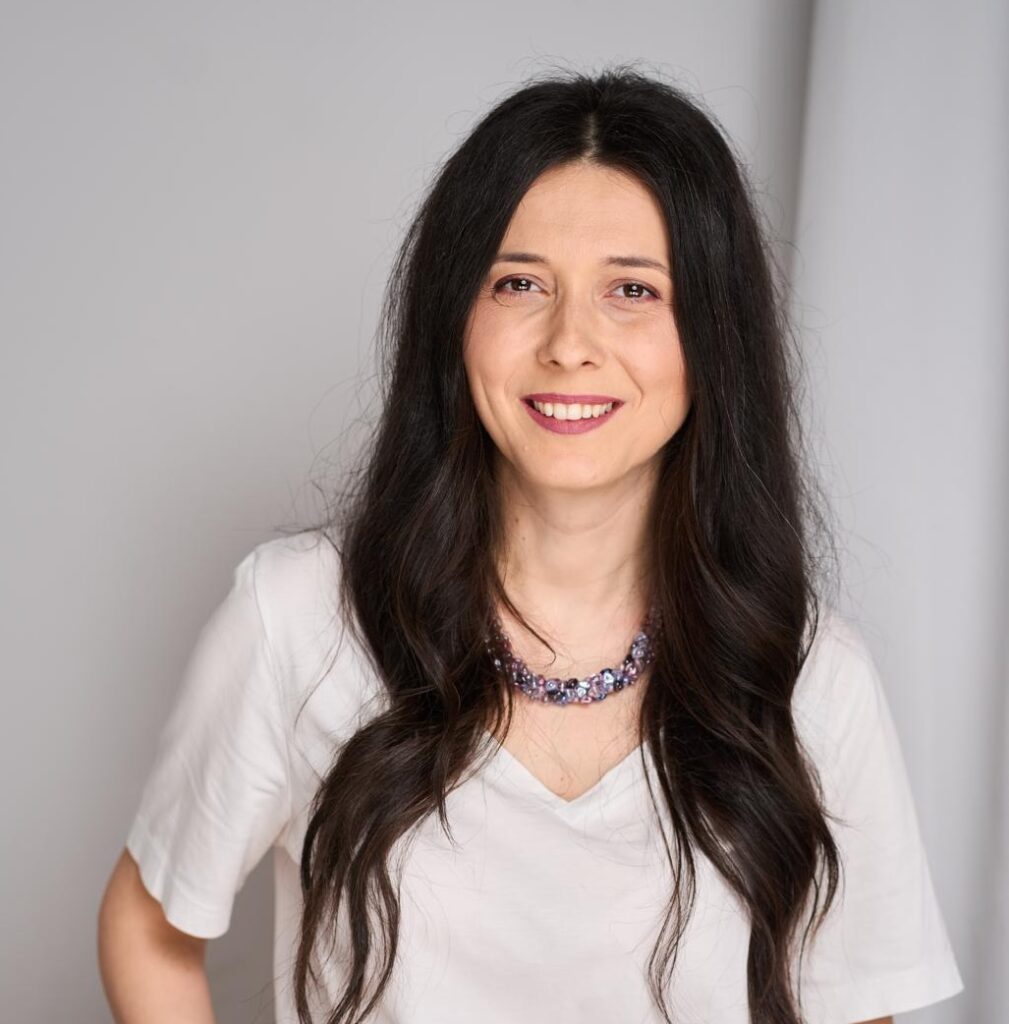
Psychologist Andreea Goliță: "You need to learn to translate your emotional states. To know what's happening to you. Not just to have emotional intelligence but the ability to withstand those difficult emotions: fear, anxiety, panic" - Photo: Personal archive/ Andreea Goliță
Out of Romania's 19 million inhabitants, only around 6 million know how to swim, according to a global survey commissioned by the OECD two years ago. Among them, less than a million swim correctly and consistently. Those who do know that in this sport, you continuously perfect yourself, always. At any level you are, you can still improve something related to posture, arm mechanics, legs. Always and always, in the battle with hundredths of a second, there is a better position, a stronger turn at the end of the pool, a more efficient underwater movement.
In swimming, talent and physical strength are not decisive, they don't make a difference in the pool. What makes the difference is the obsession with details, a strong psyche that allows maximum concentration, to withstand a crushing routine of endlessly repeating postures, movements, pushes, displacements, and water hits.
"In terms of the race, I believe the one who wins is the one who manages to distance himself from competitors. So, I built walls for each lane of the pool and imagined myself swimming alone," stated David Popovici, in an interview given to the organizers, immediately after exiting the pool.
Fear
His words shed a bit of light on the mysterious power of concentration that a sportsman must achieve to attain such performance.
"I improved most in underwater technique compared to last year, and what I did differently in the 200 and 100-meter events was the length of my arms. These are geeky, boring, technical details, but they work for me. This race was a perfect 10 out of 10. I'm not the type to say that. You never have a 10, but I believe today was a 10 out of 10. I will rejoice and celebrate," he added.
He made no reference to muscles or strength, only to the mind. At this level, all competitors have muscles and strength; what sets them apart is higher, in the mind.
Before the World Championships, David Popovici wanted to give up. He even started looking online for return tickets home.
"Three days before the competition started, I experienced something I had never experienced before. And that is to be afraid," he confessed.
The difficult moment, what scared him, according to his statements, was the possibility of reaching his maximum potential.
"What David Popovici expressed is a profoundly human fear. Authentic success takes us out of anonymity, makes us visible. No one protects us anymore. And then there is a real psychological training needed, not just for performance but to maintain your emotional balance," stated Andreea Goliță, the psychotherapist consulted for writing this article.
In a country where thousands of people have been subjugated by Russia's lies and propaganda, who run frantically around the new Petrache Lupu, supported and financed by Moscow, there is Călin Georgescu, in a country where rapid enrichment, by any means, is the main goal in life, and social models are superficial characters, who have spun around, the appearance of an athlete like David Popovici can be considered a miracle.
800 Children Swim, Inspired by David Popovici
"We tried to cover all the shortcomings. David Popovici was a pilot project for the club in which we invested following an international model," stated Ionuț Popa, president of Dinamo Sports Club, in an interview for Spotmedia.ro.
"David Popovici didn't come to Dinamo for money, but because he felt that our mentality matched his values. David's father is very well organized, calculates everything, plans everything. Collaboration with his parents was essential. We have a good relationship with the family, with the athlete, we have the necessary infrastructure, prompt recovery, and the results are visible," added Ionuț Popa, a 37-year-old manager, a police officer by profession, employed by the Ministry of Internal Affairs.
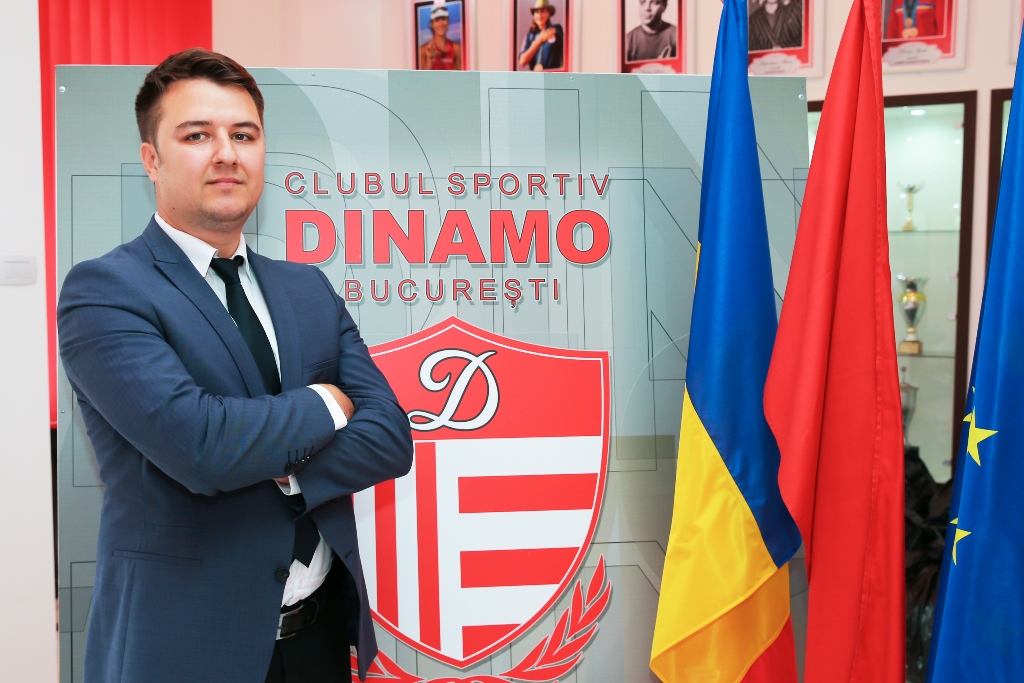
Ionuț Popa, president of CS Dinamo: To David Popovici, "we offered a decent salary, but more importantly, we provided everything he needs: healthy nutrition, mobility, peace, timely recovery. We tried to address all infrastructure or staff issues," - Photo: Facebook/ CS Dinamo
David Popovici joined Dinamo four years ago, before winning his first world titles, starting from Steaua. At that time, there were certain discussions and tensions between the two clubs, but the infrastructure on Șoseaua Ștefan cel Mare weighed decisively - an Olympic indoor swimming pool and an outdoor one, both functional, were the main arguments.
"We created a swimming academy around David Popovici, and now over 800 children swim inspired by him," added the president of CS Dinamo.
Earlier this year, in an interview, David Popovici announced that he bought a Porsche car. His confession sparked a national debate - whether he acted correctly or not.
Cristian Tudor Popescu criticized him, saying that a role model athlete should not have superficial tendencies.
"...the dream of an intelligent and educated person should be to create something, not to buy ready-made things...," said the famous journalist.
Public opinion was divided into two camps at that time, one supporting that he did well, the other criticizing him. The effect of the debate, accelerated by social networks, was that it put great pressure on a 20-year-old who dared to fulfill a dream so dear and difficult to achieve for most boys at that age.
His critics failed to make a simple gesture of fair play required in a debate, that of putting themselves in the shoes of the one they are opposing for at least a few minutes and seeing how they would behave under the given conditions.
Personally, I admit that if I were the fastest swimmer in the world, an Olympic champion at 20, I would have bought a Porsche, a Ferrari, and a Lamborghini. From the wisdom that comes with age, it is easy to give young people useless advice.
David Popovici is not just a role model for behavior, for the natural way in which he communicates and expresses his personality, but he is also a social model that can transform public policies regarding sports performance, education, and health. Popovici is a stroke of luck for our time, one that changes us for the better, whether we like it or not.

